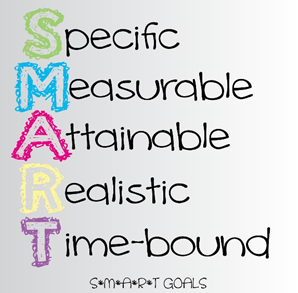We’ve all been there, you know that feeling of ‘I’m invincible, I can do it all.’ which is great when the adrenaline kicks in, your energy is high and you’re super motivated to achieve your goals, your dreams. But when the reality of what that actually means hits, in terms of planning and juggling and tweaking and prioritising, you can become a little deflated.
Well, there’s a simple way to avoid that happening and it’s actually a little trick that entrepreneurs use to achieve the business aims of their growing empire, whatever it may be.
It’s about being S.M.A.R.T and using S.M.A.R.T objectives to organise yourself and your thinking into smaller, practical steps that will help you achieve that ultimate goal. So whether it is to start your blog post, finish writing a book, read the book that’s been sitting next to your bed for months or the web page you have been putting off planning think S.M.A.R.T.
What does S.M.A.R.T mean?

Source: Image: ww.pcg-services.com/strategic-planning-objectives-goal-setting-steroids
Applying S.M.A.R.T to your writing goal.
So let’s say your goal is to write a novel. A novel is complicated and multi-faceted so each aspect will need to be looked at and planned for individually and using S.M.A.R.T will help you approach this logically.
S – you will have to be SPECIFIC about this. So which aspect of your writing are you going to focus on? Is it the research? The main theme? The planning? The feedback? Different aspects will have different considerations so break it down and be SPECIFIC.
M – in order to reach the point of achieving your goal you must make it MEASURABLE in some way. This is how you will measure whether you have been successful in achieving your goal. Is it by the number of pages you have written? Is it by the amount of research hours you have completed? Is it by word-count? Is it in terms of the total goal? For example, I aim to have written 3/20 chapters, or 35% of the total book.
A – goals must be ATTAINABLE. And this links to being REALISTIC and TIME-BOUND. You cannot, if you work full-time, expect to sit down in one hour and complete your website. So think in smaller ATTAINABLE goals. Aim to complete a certain number of hours or sittings, or a word-count by a certain time (TIME-BOUND).
R – Don’t rush in and set unrealistic goals for yourself. This will only add pressure on you and if the stress becomes too much you are less likely to see the project through. So be REALISTIC. Saying to yourself I’m going to write 15,000 words a day or three chapters a day when you work full-time, have family commitments and a busy social life is setting yourself up for failure before you’ve started. Instead, think about what you could achieve REALISTICally and if you go over and beyond that then it’s a bonus.
T – TIME-BOUND simply means adding a time frame to your goal. Think about when and how you will achieve your goal? When will you work at it? Is it per day, once a week, three hours a day, every weekend for a month? You may put in a date that you aim to complete the goal by.
By being S.M.A.R.T you are more likely to achieve your goals and you will be motivated to continue working towards them and reap the success you deserve!
So, go forth, be S.M.A.R.T and feel free to share your experience of setting and achieving your goals in this way. I look forward to hearing from you. Good Luck!

